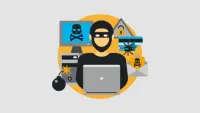
Learn Ethical Hacking : Beginner to Advanced! 
This comprehensive course provides an in-depth exploration of ethical hacking, Kali Linux, and Python hacking. Gain the skills and knowledge to become an advanced ethical hacker. ▼
ADVERTISEMENT
Course Feature
![]() Cost:
Cost:
Free Trial
![]() Provider:
Provider:
Udemy
![]() Certificate:
Certificate:
No Information
![]() Language:
Language:
English
![]() Start Date:
Start Date:
Self Paced
Course Overview
❗The content presented here is sourced directly from Udemy platform. For comprehensive course details, including enrollment information, simply click on the 'Go to class' link on our website.
Updated in [April 29th, 2023]
This course provides an introduction to ethical hacking and the tools and techniques used by professional penetration testers. Students will learn how to set up a Kali Linux system, essential Linux system commands, and how to create a secure penetration testing environment. The course will cover topics such as footprinting, scanning, website penetration testing, WPA2 wireless network cracking, man in the middle attacks, system hacking, and Python programming fundamentals. Students will also learn how to write their own pen testing tools such as reverse shell, keylogger, and brute forcer. Finally, the course will provide tips for building a career in cybersecurity.
[Applications]
After completing this course, students can apply their knowledge to a variety of areas. They can use their skills to secure their own systems, or to help others secure their systems. They can also use their knowledge to help organizations identify and fix security vulnerabilities. Additionally, they can use their skills to develop their own security tools and applications. Finally, they can use their knowledge to pursue a career in cybersecurity.
[Career Paths]
1. Cybersecurity Analyst: Cybersecurity analysts are responsible for monitoring networks and systems for security threats and vulnerabilities. They use a variety of tools and techniques to identify, analyze, and respond to potential security risks. As the demand for cybersecurity professionals continues to grow, the job outlook for cybersecurity analysts is very positive.
2. Penetration Tester: Penetration testers are responsible for testing the security of computer systems and networks. They use a variety of tools and techniques to identify and exploit security vulnerabilities. As organizations become increasingly aware of the need for strong security measures, the demand for penetration testers is expected to continue to grow.
3. Security Engineer: Security engineers are responsible for designing, developing, and implementing security solutions for organizations. They use a variety of tools and techniques to ensure that systems and networks are secure and compliant with industry standards. As organizations become increasingly aware of the need for strong security measures, the demand for security engineers is expected to continue to grow.
4. Security Architect: Security architects are responsible for designing and implementing security architectures for organizations. They use a variety of tools and techniques to ensure that systems and networks are secure and compliant with industry standards. As organizations become increasingly aware of the need for strong security measures, the demand for security architects is expected to continue to grow.
[Education Paths]
1. Bachelor's Degree in Cybersecurity: A Bachelor's Degree in Cybersecurity is a great way to gain the knowledge and skills needed to become an ethical hacker. This degree program typically covers topics such as computer networks, cryptography, computer forensics, and ethical hacking. It also provides students with the opportunity to gain hands-on experience with the latest security tools and techniques. As the demand for cybersecurity professionals continues to grow, this degree path is becoming increasingly popular.
2. Master's Degree in Cybersecurity: A Master's Degree in Cybersecurity is a great way to further develop your skills and knowledge in the field. This degree program typically covers topics such as advanced cryptography, network security, digital forensics, and ethical hacking. It also provides students with the opportunity to gain hands-on experience with the latest security tools and techniques. As the demand for cybersecurity professionals continues to grow, this degree path is becoming increasingly popular.
3. Certificate in Ethical Hacking: A Certificate in Ethical Hacking is a great way to gain the knowledge and skills needed to become an ethical hacker. This certificate program typically covers topics such as computer networks, cryptography, computer forensics, and ethical hacking. It also provides students with the opportunity to gain hands-on experience with the latest security tools and techniques. As the demand for cybersecurity professionals continues to grow, this degree path is becoming increasingly popular.
4. Doctorate in Cybersecurity: A Doctorate in Cybersecurity is a great way to gain the highest level of knowledge and skills in the field. This degree program typically covers topics such as advanced cryptography, network security, digital forensics, and ethical hacking. It also provides students with the opportunity to gain hands-on experience with the latest security tools and techniques. As the demand for cybersecurity professionals continues to grow, this degree path is becoming increasingly popular.
Course Syllabus
Introduction and Installation
Basic Linux Commands
Creating a Secure Hacking Environment
Footprinting
Scanning
Website Penetration Testing
WPA2 Wireless Cracking
Man in the Middle Attacks
System Hacking
Python Crash Course
Coding an Advanced Backdoor
Creating a Keylogger for the Backdoor
Basic Authentication Bruteforcer
Course Provider

Provider Udemy's Stats at AZClass
Discussion and Reviews
0.0 (Based on 0 reviews)
Explore Similar Online Courses

Wildfire Disaster Response

Create a Business Marketing Brand Kit Using Canva

Python for Informatics: Exploring Information

Social Network Analysis

Introduction to Systematic Review and Meta-Analysis

The Analytics Edge

DCO042 - Python For Informatics

Causal Diagrams: Draw Your Assumptions Before Your Conclusions

Whole genome sequencing of bacterial genomes - tools and applications

Ryan Montgomery - #1 Ethical Hacker Who Hunts Child Predators Catches One Live On Podcast SRS #56

Become Master in Ethical Hacking with Android (without Root)


Start your review of Learn Ethical Hacking : Beginner to Advanced!